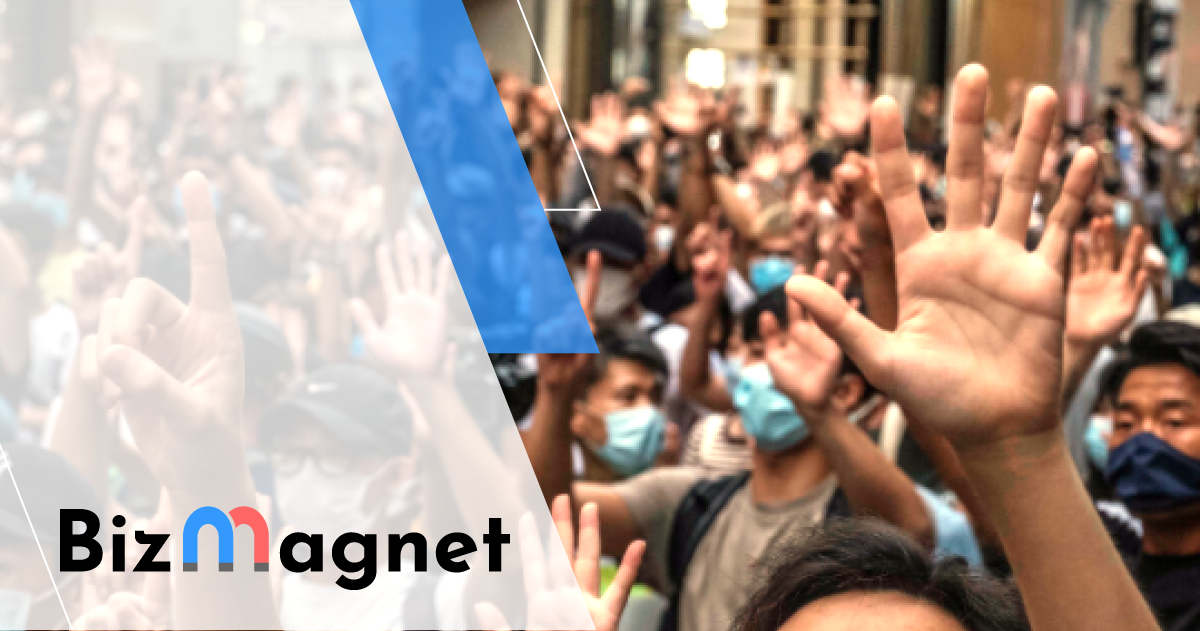George Leung Siu-kay, the CEO of the Hong Kong General Chamber of Commerce (HKGCC), expressed in “Letter to Hong Kong“, a RTHK programme, that Hong Kong is no longer a business-friendly place. The social gathering ban has frozen small businesses. Though subsidy and compensation is helpful, the most important is to control the virus spread. Even the epidemic is under control, Hong Kong is still under local and global political influence. It is hard for businesses to adapt and easily get involved.1 BizMagnet consultant feels overwhelmed with this a lot. Since social unrest in 2019, series things happened. COVID-19, local political issues, international politics and so on. The consultant repeated again that local economy will be in unprecedented storm and businesses should act with careful risk management. Expanding in other market is also a good choice.
Hong Kong in the new cold war
Last year, the Chief Executive Carrie Lam proposed the extradition bill and triggered the largest social conflict in decades. Local businesses such as catering and retail suffered from the impact first. However, the Hong Kong government (and so to Chinese government) reacted strictly. Not taking account of 2019 social unrest and 2020 COVID-19 epidemic, the authority implement the controversial national security law during the second wave of epidemic. The act shocked international community and gave a reason of following series of reaction to Washington, such as Hong Kong status normalization and sanction against Hong Kong officials. This structurally changes the traditional status of Hong Kong in international trade. For a very long time, the Hong Kong colony acted as a special role between China and the West. This status didn’t change even during the early time after reunification. Mainland kept Hong Kong a high autonomy to maintain the role. Now thing changes and Hong Kong is no longer “special”. If there is no difference between Hong Kong and China, the role must change. The new position of Hong Kong also impacts technology development. For example, Google and Facebook’s fastest undersea light cable connects Hong Kong no more. It is very uncertain for Hong Kong economic recovery if it is all dependent on a single economy of China. Macau had a very poor economic performance last quarter even it controlled the epidemic very well. This shows the fragility of a mono-economy.
Business uncertainty due to epidemic and politics
Hong Kong government gave an impression of “piecemeal” policy approach. For instance, in response to epidemic, they set up D-Biz but bad comments returned. It disappointed a lot of applicants and suppliers. George Leung emphasized that subsidy can’t help a lot if we can’t control the virus spread. Besides a possible COVID-19 return in the winter, social unrest (“riot” for government or “resistance” for protesters) is also possible to return. The political issue can’t be solved by strict rules. The Legco election postponement for a year gave a very wrong message that the Hong Kong government had no confidence to stop the epidemic, and set a political time bomb as well. Protesters attempted in this month, and Hong Kong Police garrisoned at the streets of Kowloon. There was no protest, however, there was no business, either. It is difficult for the street business to recover.
BUD Fund: GBA or ASEAN
We can’t see a clear exit, nor the determination of the government. The only thing the authority can do is welfare giving for individuals and corporate. The BUD Fund encourages Hong Kong companies to expand the markets in mainland China (Mainland Programme) and ASEAN (FTA Programme). The maximum cumulative grant is HK$4,000,000. The BUD Fund recorded a grant hike in first half of 2020, and this shows a significant demand. For a successful BUD application, please consider to hire a professional BUD consultant. BizMagnet is the one.
Furthre reading: Should I apply for the BUD Fund or the TVP?
- (Chinese only)梁兆基:本港已非營商樂土 商界於政治爭拗中動輒得咎, RTHK, https://news.rthk.hk/rthk/ch/component/k2/1550500-20200919.htm

